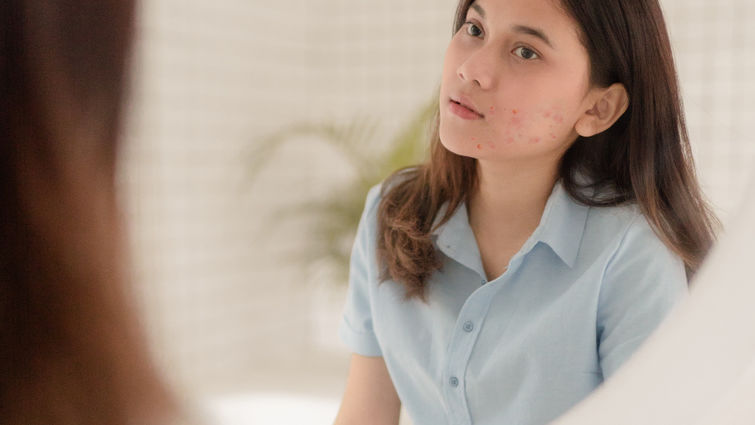
As more states and businesses across the country require people to wear face coverings in public in order to fight the spread of COVID-19, individuals with sensitive skin are asking how you fight what’s under the mask — skin irritation and acne.
Harry Dao, MD, FAAD, a dermatologist for Loma Linda University Health explains what maskne is and how to prevent it.
Dao says maskne isn’t a new phenomenon, as medical professionals who have worn masks can attest to this pesky skin problem, but the condition has become more widespread amongst the general population.
Maskne: What it is and why it happens
The medical term for “maskne” is acne mechanica, a skin condition brought on by prolonged wear of facial personal protective equipment. “Masks impose heat, friction and occlusion on the skin and when combined with a moist environment from breathing, talking or sweating, this is a recipe for breakouts,” Dao says. “Pores get clogged and can become pimples or acne cysts. On top of that, the prolonged occlusion, heat and sweat can cause the skin to become dry, itchy and raw.”
Acne, isn’t the only skin condition reported by mask wearers, Dao says. Other common face mask skin problems include:
- Allergic contact dermatitis – Some manufactured masks may contain a chemical that causes an allergic reaction. Formaldehyde and bronopol can be found in polypropylene surgical masks.
- Rosacea – Classically worsened by heat and stress, mask wearing can increase flares.
- Seborrheic dermatitis – It causes scaly plaques, inflamed skin and stubborn dandruff.
- Folliculitis – When yeast or bacteria infect hair follicles.
How to prevent it
Dao offers six skin care tips to protect your face from mask irritation.
- Wash your face first – Use a gentle cleanser that is free of fragrance and oil and rinse with lukewarm water. “This prevents dirt and oil from being trapped on the skin surface, which cause breakouts,” Dao says. “Your face should always be clean before you put on your mask.”
- Apply a moisturizer – Not only will this keep your skin hydrated, it will also act as a barrier between your face and your mask, reducing friction. Apply onto a cleansed face before and after wearing a mask. Dao says to look for moisturizers that contain ceramides, hyaluronic acid, or dimethicone, which will provide extra protection. Take care to avoid fragrances amongst other common contact allergens. This may take trial and error to find the right formulation for your skin type.
- Ditch the makeup – Wearing skin makeup under a mask causes clogged pores and breakouts, according to the American Academy of Dermatology. Makeup residue will also soil your mask.
- Wash your mask – If wearing a cotton mask wash it after each use as its surface contains dirt and oil and can become a breeding ground for bacteria from your nose and mouth.
- Choose a fragrance-free laundry soap – Fragrances can irritate your skin — skip the fabric softener, too.
- Stay away from harsh products – Medicated skin care products that contain benzoyl peroxide, retinols and salicylic acid will be more irritating to the skin under a mask — be careful about how much and what you use.
How to treat common skin issues
This is what you can do at home to help treat some of the most common mask-related skin issues, Dao says.
- Acne or breakouts – Add a glycolic acid wash and a light “non-comedogenic” moisturizer to your pre-mask regimen. Move the application of leave-on skin care products to times not wearing mask at home. If breakouts, redness or swelling still persist, seek medical care with your physician.
- Dry skin – Always apply a good moisturizer to the skin before you put on a mask. After you take it off, cleanse the skin and apply a bland emollient. Commonly, natural or botanical substances can contain allergenic products, so beware.
When to make a doctor’s appointment
If you don’t see a difference in your skin after implementing the skin care tips above, it may be time to call your dermatologist, Dao says. He especially encourages a visit, whether it be in-person or via telehealth using MyChart, if you note signs of infection such as redness and puss.
“Having the right skin care routine will lessen mask-related skin irritation and maskne,” he says.
You can also schedule an appointment or request more information by calling 909-558-2890 or by visiting the Loma Linda University Health Dermatology website.
